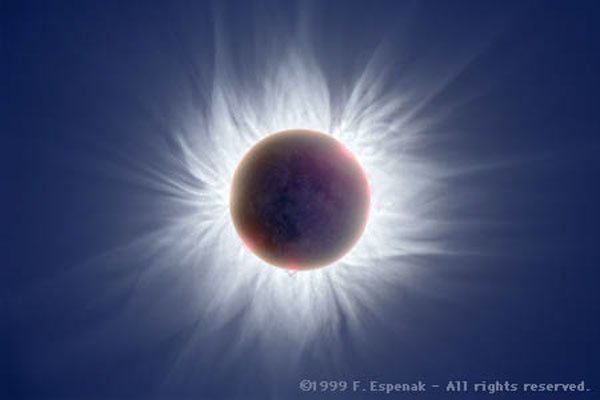Explanation: Most photographs don't adequately portray the magnificence of the Sun's corona. Seeing the corona first-hand during a total solar eclipse is best. The human eye can adapt to see features and extent that photographic film usually cannot. Welcome, however, to the digital age. The above picture is a combination of twenty-two photographs that were digitally processed to highlight faint features of a total eclipe that occurred in August of 1999. The outer pictures of the Sun's corona were digitally altered to enhance dim, outlying waves and filaments. The inner pictures of the usually dark Moon were enhanced to bring out its faint glow from doubly reflected sunlight. Shadow seekers need not fret, though, since as yet there is no way that digital image processing can mimic the fun involved in experiencing a total solar eclipse. The next total solar eclipse will be visible from parts of South American and Africa on June 21.
1999 2000 2001 2002 2003 2004 2005 2006 2007 2008 2009 2010 2011 2012 2013 2014 2015 2016 2017 2018 2019 2020 2021 2022 2023 2024 2025 |
Yanvar' Fevral' Mart Aprel' Mai Iyun' Iyul' Avgust Sentyabr' Oktyabr' Noyabr' Dekabr' |
NASA Web Site Statements, Warnings, and Disclaimers
NASA Official: Jay Norris. Specific rights apply.
A service of: LHEA at NASA / GSFC
& Michigan Tech. U.
|
Publikacii s klyuchevymi slovami:
Solnechnaya korona - Sun - corona - Total eclipse - Solnce - polnoe zatmenie
Publikacii so slovami: Solnechnaya korona - Sun - corona - Total eclipse - Solnce - polnoe zatmenie | |
Sm. takzhe:
Vse publikacii na tu zhe temu >> | |
